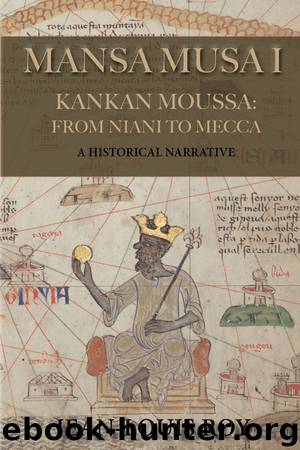MANSA MUSA I by Jean-Louis Roy

Author:Jean-Louis Roy
Language: eng
Format: epub
ISBN: 9781771614054
Publisher: Mosaic Press
Published: 2019-08-19T16:00:00+00:00
Tunis and Kairouan
It was a caravan severely marked by several very trying weeks, physically and psychologically, by the anxiety of the men and the desolation of the earth that set up camp near Ghat, one of the most important crossroads of the Sahara. The main road that crosses the continent from East to West meets the road running northwest to Kairouan and Ifrikiya. Here, like a dislocated triangle, the roads connect Cairo, Tunis and Ghat.
In this unremarkable agglomeration with its modest mosque and squat houses, the comings and goings of travellers creates a hubbub that contrasts with the isolation felt on the long road travelled since Buda. Of course, the caravans don’t stay long here, and at the covered market in Jerid the volume of their purchases is all in all rather modest. But Ghat is a meeting place, and that creates life.
The royal encampment stands out in this location. A distinct atmosphere of resurrection reigns. Finally the weather is mild, the air light, water abundant, and the provisions fresh. The dispatches from Niani are reassuring after a long period where the news had sown anxiety and disarray.
The beginnings of a drought afflicted the north of the kingdom. The situation had rapidly become difficult, very difficult. The local populations had begun to migrate in search of pastures and water.
Fresh in everyone’s memory were the tragic results of the last great drought, the human misery, the desolation of the lands, the death of thousands of men and the complete disappearance of the livestock.
Suddenly the earth was transformed into cracked and creviced granite over which a fine burning dust blew. There was no longer any trace of the least moss, no life to a depth of a hundred metres.
The heat absorbed the air and burned all horizons. The disaster had slowly diminished. It had taken more than twenty years to recreate life in all that desolation, twenty years of hard labour. At the thought of reliving such a calamity, everyone would lapse into a deathlike silence.
The most recent dispatches were bringing good news. Rain had arrived and, for the moment, all danger seemed to have been warded off in the kingdom. By way of recognition, the king endowed Ghat with a superb madrasa and two chests of unworked gold coins for the poor people of Cairo.
The camp is swarming with intense activity. “Everything should be made new like it was for the departure from Niani,” the grand chamberlain ordered. Everyone devotes himself to the task.
During this time, the King receives two groups of visitors, the first arriving from Tunis, the second from Kairouan.
The advisor to Sultan Abou Yahia of Tunis had asked to see the King. He arrives at the audience with a young disciple of Ibn Quaddah, one of the greatest jurists of his time whose legal decisions, the famous fatwas, are well-known, commented and appreciated throughout the Empire. Though legal in nature, these decisions also draw on philosophy. Ibn Quaddah, taking his inspiration from Ibn Sina, attempts to distinguish in
Download
This site does not store any files on its server. We only index and link to content provided by other sites. Please contact the content providers to delete copyright contents if any and email us, we'll remove relevant links or contents immediately.
| Africa | Asia |
| Canadian | Europe |
| Holocaust | Latin America |
| Middle East | United States |
Fanny Burney by Claire Harman(26602)
Empire of the Sikhs by Patwant Singh(23084)
Out of India by Michael Foss(16853)
Leonardo da Vinci by Walter Isaacson(13336)
Small Great Things by Jodi Picoult(7140)
The Six Wives Of Henry VIII (WOMEN IN HISTORY) by Fraser Antonia(5515)
The Wind in My Hair by Masih Alinejad(5095)
A Higher Loyalty: Truth, Lies, and Leadership by James Comey(4962)
The Crown by Robert Lacey(4814)
The Lonely City by Olivia Laing(4801)
Millionaire: The Philanderer, Gambler, and Duelist Who Invented Modern Finance by Janet Gleeson(4478)
The Iron Duke by The Iron Duke(4354)
Papillon (English) by Henri Charrière(4274)
Sticky Fingers by Joe Hagan(4198)
Joan of Arc by Mary Gordon(4109)
Alive: The Story of the Andes Survivors by Piers Paul Read(4031)
Stalin by Stephen Kotkin(3965)
Aleister Crowley: The Biography by Tobias Churton(3640)
Ants Among Elephants by Sujatha Gidla(3467)
